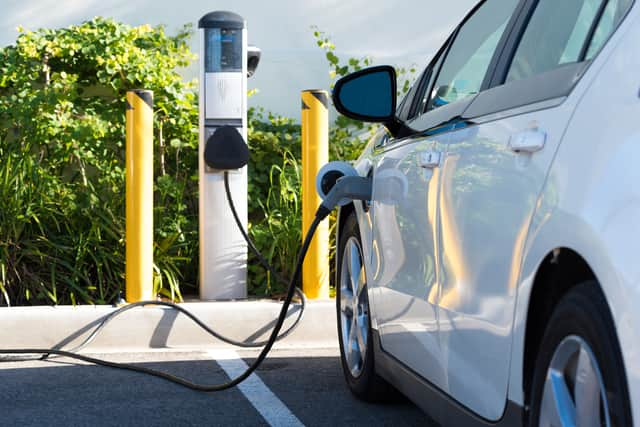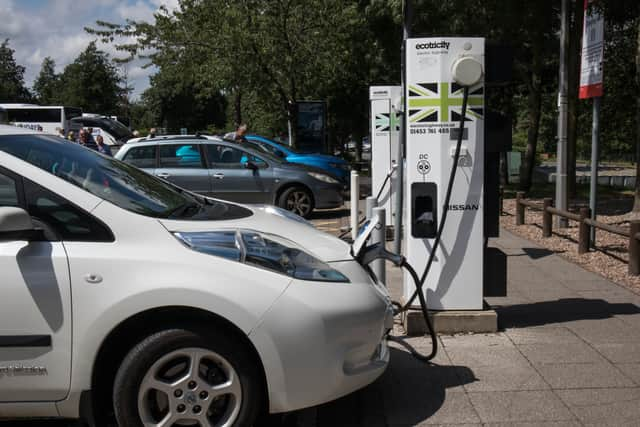EV charging costs: how do electric car running costs compare with petrol as public prices rise?


The cost of charging an electric car at a public rapid charger has jumped by more than 40% in the last four months, according to the latest figures.
It now costs an average of 18.75p more per kilowatt hour (kWh) than it did in May and means it now costs £32.41 to rapid charge a typical family-sized electric car with a 64kWh battery to 80%. That is an increase of almost £10 since May and more than £13 more than in September 2021.
Advertisement
Hide AdAdvertisement
Hide AdThe soaring wholesale cost of gas and electricity has pushed up prices across the public charging network and recently saw one operator hike their prices to £1 per kWh at its ultra-rapid devices.
The new figures from the RAC’s Charge Watch service also show that at ultra-rapid chargers (100kW+) costs increased by 25%, or 12.97p, between May and September, with the current average price sitting at 63.94p per kilowatt hour. This puts the cost of an 80% charge at £32.74, up from £26.10 in May and from £17.51 in September 2021 - an 87% increase.


Although many EV drivers do most of their charging at home, the RAC - which backs calls to cut public charging VAT to 5% - has raised concerns that the soaring cost of public charging could dissuade drivers from switching to an electric vehicle, particularly the estimated 40% who don’t have access to off-street parking. The data comes as an AA survey also found that three in five drivers were being put off buying an EV by rising domestic energy costs.
While petrol and diesel prices have fallen in recent weeks, the RAC’s figures show that a publicly charged EV is still marginally cheaper per mile than a combustion engined car.
Advertisement
Hide AdAdvertisement
Hide AdBased on an EV operating at 3.5 miles per kWh and a car averaging 40mpg, they show that a driver exclusively using rapid or ultra-rapid public chargers will now pay around 18p per mile, up from an average of 13p in May. This compares to 19p per mile for a petrol car and 21p per mile for a diesel one.
For drivers charging at home the gap is significantly wider, even with the impending jump in the energy price cap to 34p per kWh. Under the Energy Price Guarantee coming into effect on 1 October, a driver charging at home will pay around 9p per mile, or £17.87 for an 80% charge, which will be reduced further for anyone on an EV-specfic tariff.
Loading....
Cheaper running costs have long been one of the biggest selling points for EVs - which cost more to purchase than an equivalent petrol or diesel. In early 2022 as petrol and diesel prices soared, the gap widened and EVs became even more appealing. However, the recent turmoil in the energy market and drop in oil prices has significantly reduced the difference.
Narrowing gap with ICE
RAC EV spokesperson Simon Williams said the figures painted a “bleak” picture for drivers reliant on public chargers.
Advertisement
Hide AdAdvertisement
Hide AdHe said: “For those that have already made the switch to an electric car or are thinking of doing so, it remains the case that charging away from home costs less than refuelling a petrol or diesel car, but these figures show that the gap is narrowing as a result of the enormous increases in the cost of electricity.
“The Energy Price Guarantee benefits those drivers who are fortunate enough to charge their cars at home, but for those that rely on the public charging network – including those without driveways – it’s a much bleaker picture right now.
“The fact wholesale energy will prices be capped for six months should lead to some price reductions by charge point operators in the coming weeks – but what EV drivers don’t want to see is operators having to hike their charges next spring if wholesale costs keep climbing.”
Mr Williams said that while the Government has huge ambitions for the expansion of the UK’s charging network, it was relying on private operators to do the “heavy lifting” and he repeated the RAC’s calls for the Treasury to support operators by cutting VAT.
Advertisement
Hide AdAdvertisement
Hide AdLoading....
He added: “The Government needs to redouble its efforts in helping drivers to go electric if it is to meet its own net-zero transport objectives and levelling the public and domestic electricity VAT rates would show it is serious about doing so at a time when household budgets are getting ever tighter.”
Responding to the AA’s findings that 60% of drivers were being put off EVs by soaring energy costs, the motoring group’s head of road policy, Jack Cousens, added: “With much focus on the 2030 ban on the sale of new combustion cars and vans, lawmakers need to keep a watchful eye on how energy prices will impact the transition to electrification as much as the traditional barriers to ownership.”
Comment Guidelines
National World encourages reader discussion on our stories. User feedback, insights and back-and-forth exchanges add a rich layer of context to reporting. Please review our Community Guidelines before commenting.
